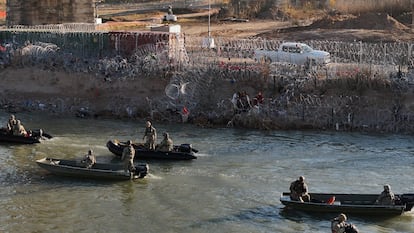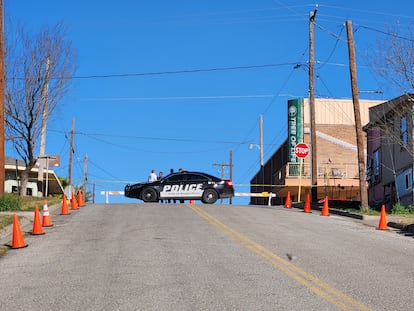Eagle Pass: a trip to the heart of the confrontation over control of the US-Mexico border
Local residents and businesses are feeling the strain after Texas Governor Greg Abbott militarized a popular city park in a standoff with federal authorities over immigration


In 1865, Confederate Brigadier-General Joseph O. Shelby threw his flag into the waters of the Rio Grande, near the small present-day border town of Eagle Pass, and crossed into Mexico rather than surrender. Today Eagle Pass has become the epicenter of a tough battle with constitutional implications that pits the federal government against Texas over immigration control; the Texas National Guard against the federal Border Patrol; Republicans against Democrats. And all these clashes come together in one spot: a 19-hectare park on the banks of the Rio Grande whose name honors the secessionist officer.
Shelby Park used to be a place where the residents of Eagle Pass, a town of 28,000 residents that votes Democratic and lives off trade with Mexico — two bridges connect it with Piedras Negras — and where Spanish is spoken as much or more than English, once came to fish, gather for picnics and celebrations, and to go for strolls. This past weekend, a poster announced a concert for February 28 by the association led by the late pastor Billy Graham, spiritual advisor to several presidents. As things stand, however, it is unlikely that the event will be held.
Barbed wire and a wall of cargo containers now prevent access to the river. The entrances from the street are fenced and blocked by military vehicles. National Guard soldiers, armed with automatic rifles, control the access points and the only existing ramp for boats and kayaks to the river. Residents cannot access the park, and by order of the Texas governor, the Republican Greg Abbott, neither can Border Patrol officers, who until last month had used it as a processing area for immigrants crossing the river. The decision has canceled the longstanding collaboration between both agencies.
“And we are caught in the middle of all this,” sighs Juan Hernández, who runs a clothing and footwear store a few feet away. The blockade of the city park has turned that area — until recently very busy due to its proximity to Shelby and the border post — into something of a ghost area, where this weekend there were more local police officers and patrol cars than civilian traffic. “This is harming our economy,” laments the store owner, who is offering drastic discounts on his products. “But what scares us even more is that there could be an incident where someone loses control.”
The confrontation broke out last month, when Abbott gave the order to the Texas National Guard to take control of Shelby Park, following a surge in undocumented arrivals in December. The Biden Administration appealed to the courts against that decision, arguing that it prevented the Border Patrol from doing its job. In mid-January, barbed wire fences and other obstacles prevented these agents from rescuing a family of three migrants who ended up drowning, the government said.
The Supreme Court agreed and ordered that the razor wire be removed. But the Texas governor has interpreted the ruling in the most limited way possible: that border agents may cut the wire only to help a migrant in danger. In the meantime, he promises to reinforce the fences and the wires. His argument: that the federal government’s policy favors migrants to the point of endangering Texas, and that the state has the right to defend itself against what it defines as an “invasion.”
The case has generated a political standoff that goes beyond the mere clash between federal and state authorities. Other states such as Florida have sent soldiers from their own National Guard to reinforce the Texas agency. This weekend, a convoy of supporters of Republican presidential hopeful Donald Trump arrived near Eagle Pass after traveling halfway across the country to express their support for anti-immigration policies. Abbott himself showed up this Sunday in Eagle Pass to defend his policies at a news conference, along with 14 of the 25 Republican governors who have expressed their support for him. The event caused some discomfort among part of the population.
“As a longtime resident, I have never been more upset with a leader than with our governor, and what he is doing, and how he is using our community in particular for political theatrics,” said the businessman and educator Jessie Fuentes at a news conference of community leaders. “They have appropriated a public park, our park, our history, our culture. This is where we gather, it’s our green space, where we are connected to the river, and now we don’t have access to it. And if you take a walk and look, you can see that it is becoming a military base.”

Others in Texas think otherwise. “We are here to support this cause and Governor Abbott. We believe you are doing the right thing. We have to regain control of our borders. We don’t have to let millions of migrants come in. When we go to vote in November, immigration will be our top priority. The second, the right to bear arms,” say David and Sandy, a couple who drove three hours on Saturday to take part in the rally to welcome the anti-immigrantion caravan.
That day, the Mission: Border Hope immigrant shelter temporarily closed its doors. It had moved its occupants to other places due to fear of possible incidents. The transfer was not difficult, as the shelter only accommodated a handful of people. The number of migrants coming to the shelter in search of help, once the Border Patrol has released them with a summons to appear in court to decide on their asylum applications, once reached as high as 1,200 a day, but is currently only around 20. The decrease is in line with the drop in irregular arrivals recorded in January, which Abbott attributes to his tough policy, while the federal government and non-profits claim it is a seasonal oscillation.
Abbott’s defiant stand comes while in Washington a group of Republican and Democratic senators agreed on a bill that would reform the current immigration system to introduce tougher measures. Among other things, they would give Biden the authority to “close the border,” as he himself has declared, if encounters exceed 8,500 in a single day, or reach a daily average of 5,000 in a week. The measure would also make it more difficult to apply for asylum, which is what most migrants who arrive irregularly do.
But whether the bill will clear Congress remains to be seen. In the Senate it will require the affirmative votes of nine Republicans. And in an election year, Republican lawmakers are reluctant to approve anything that could be construed as a success for Biden. Donald Trump opposes the measure and intends to make migration the main issue of the presidential campaign. House Speaker Mike Johnson has already asserted that the bill will be dead on arrival in the lower house. House Republicans have already taken steps to try to open an impeachment trial against the Secretary of Homeland Security and head of immigration policy, Alejandro Mayorkas.
The conversations continue, and diplomatic negotiations are intensifying. On Saturday, Biden spoke by telephone with the president of Mexico, Andrés Manuel López Obrador, to discuss immigration and “challenges at our shared border,” according to a White House statement. The conversation, in which the American leader thanked his counterpart for “Mexico’s operational support and for taking concrete steps to deter irregular migration while expanding lawful pathways,” took place after representatives of both governments met in Mexico and Washington over the last two months to delve deeper into this matter.
Meanwhile, Eagle Pass residents hope the standoff between the federal and state governments will be resolved as soon as possible. “We would like to carry on with our lives,” says Juan Hernández with a half smile, while urging his clients to take advantage of his store’s sales.
Sign up for our weekly newsletter to get more English-language news coverage from EL PAÍS USA Edition
Tu suscripción se está usando en otro dispositivo
¿Quieres añadir otro usuario a tu suscripción?
Si continúas leyendo en este dispositivo, no se podrá leer en el otro.
FlechaTu suscripción se está usando en otro dispositivo y solo puedes acceder a EL PAÍS desde un dispositivo a la vez.
Si quieres compartir tu cuenta, cambia tu suscripción a la modalidad Premium, así podrás añadir otro usuario. Cada uno accederá con su propia cuenta de email, lo que os permitirá personalizar vuestra experiencia en EL PAÍS.
¿Tienes una suscripción de empresa? Accede aquí para contratar más cuentas.
En el caso de no saber quién está usando tu cuenta, te recomendamos cambiar tu contraseña aquí.
Si decides continuar compartiendo tu cuenta, este mensaje se mostrará en tu dispositivo y en el de la otra persona que está usando tu cuenta de forma indefinida, afectando a tu experiencia de lectura. Puedes consultar aquí los términos y condiciones de la suscripción digital.








































